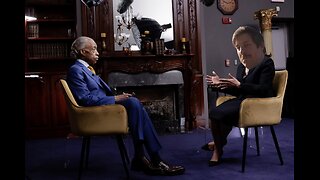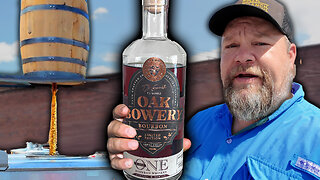Premium Only Content

An Important Conversation About How To Make Coffee
We’ve all heard the advice about how to make coffee: grind your beans fresh and use filtered water. But if you read brewing advice for long enough, you’ll also come across some less common tips. For example, some people insist that metal filters are essential because paper ones let certain flavors through. Others argue that measuring the exact volume of water is more important than just adding as much as a standard cup would hold. Even weirder, there are those who think green coffee beans have a better flavor than their darker counterparts. If you are not a coffee aficionado—and even if you are—these ideas may seem strange. After all, why make things so complicated? But here’s the thing: All of the above statements are true. The trick is understanding which details matter most in different situations. In other words, there isn’t one right way to make coffee; there are many right ways, depending on your preferences and circumstances…
How long you roast your coffee beans matters
The roasting process is what gives coffee its flavor, but the type of roast also changes the coffee bean itself. Darker roasts are more likely to have been roasted too long, which can have a detrimental effect on the coffee flavor and caffeine content. A light roast is often recommended for beginners because it is easier to control the process and get a consistent flavor. And while lighter roasts are more often recommended for beginners, it is also true that some dark roasts have more benefits. For example, a darker roast has more caffeine than a light roast. Darker roasts also contain more antioxidants than lighter roasts. Darker roasts are also more likely to be organic, so if that’s an important factor for you, keep it in mind when making your choice.
Filtered Water Is A Must
When you add water to coffee grounds, some of it evaporates and ends up in the brewed coffee. This means that not all the water in your pot came from the faucet, which means some of the flavors might come from the water in your pipes. Some water impurities, such as heavy metals, can add unwanted flavors to your coffee. That’s why filtering your water is such a good idea. Filtering your water is the best way to remove impurities that might affect the taste of your coffee. If you use tap water, consider using a filter, using bottled water, or using a coffee maker that has a built-in water filter. Remember that the cleaner your water is, the cleaner your coffee will be. Chemicals like chlorine can make coffee taste bitter, so be sure to use filtered water if your tap water tastes bad or smells weird. If your tap water tastes good but you’re still having problems with bad-tasting coffee, consider the possibility that the coffee you’re buying might be bad.
The Importance Of Measuring Volume
This is one of the most common misconceptions about making coffee, and it’s worth dispelling. The volume of water you add to the coffee grounds will have a big effect on the final flavor of your coffee. If you add too much water and don’t let the coffee “bloom”—a process in which you let the coffee mix with the water for a few minutes—the coffee will be weak and watery. If you don’t add enough water, the coffee will be strong and bitter. But there is no standard volume of water that works for all coffee. Instead, you should follow your coffee’s specific directions. If you don’t have the coffee’s instructions, you can use a simple formula: add one part water for every two parts coffee grounds.
Metal Filters Are the Best
Some people prefer paper filters because they think metal filters will impart a metallic taste to the coffee. While it’s true that some metals do change the flavor of coffee, the impurities in a paper filter are likely to be more potent than the impurities in a metal filter. That’s why all serious coffee shops use metal filters, and why top-tier coffee equipment always uses metal filters. A paper filter will catch coffee grounds, but it will also catch chemicals like the ones that make tap water taste bad. A metal filter will let some stuff through, but it will also let a lot more stuff through a paper filter. Some of the chemicals that give tap water a bad taste are also known to ruin coffee. So if you’re serious about your coffee, a metal filter is the way to go.
Conclusion
At the end of the day, the best way to make coffee is the way that you like it. If you prefer a paper filter and a one-minute pour-over, then go for it. If you want a darker roast and a metal filter, then do that as well. There is no right or wrong way to make coffee, as long as you enjoy it. Just remember that there are many different variables that go into making a great cup of coffee. So even if you’ve found the perfect recipe, don’t be afraid to experiment with different variables. And if you’re ever bored, there’s nothing wrong with making coffee exactly the same way every day. That way, you can fully appreciate how each different variable makes a difference to the flavor of your brew.
-
 LIVE
LIVE
Benny Johnson
2 hours agoKamala Campaign EXPOSED as Scam To DEFRAUD Democrats | Spiraling Drunk Kamala Posts Slurring RANT 🤣
9,763 watching -
 6:49
6:49
Colion Noir
2 hours agoFood Vendor With Concealed Handgun License Shoots Robber Dead in Chicago
1.94K3 -
 1:35:35
1:35:35
Graham Allen
4 hours agoDid Trump Just Bring Peace In Israel?! Biden Sending $24 BILLION To Ukraine! + Kamala Is Back???
107K189 -
 1:56:47
1:56:47
Matt Kohrs
14 hours agoIt's Payday Friday!!! || The MK Show
44.7K7 -
 35:31
35:31
BonginoReport
6 hours agoTackling Trump Derangement This Thanksgiving: Evita + Michael Knowles (Ep.94) - 11/27/24
91K131 -
 LIVE
LIVE
LFA TV
15 hours agoTRUMP BROKE KAMALA! | LIVE FROM AMERICA 11.27.24 11am EST
5,523 watching -
 1:50:22
1:50:22
Jeff Ahern
4 hours ago $8.11 earnedNever Woke Wednesday. The Thanksgiving show!
41K3 -
 1:34:07
1:34:07
Game On!
17 hours ago $12.72 earnedThis is BAD! Things are getting so much worse for Conor McGregor!
62K6 -
 33:38
33:38
Brewzle
1 day agoI Created My First Whiskey Blend!
85.5K11 -
 4:24
4:24
Gun Owners Of America
22 hours agoHere's Our Plan To Overturn Gun Control in 2025
70.8K32